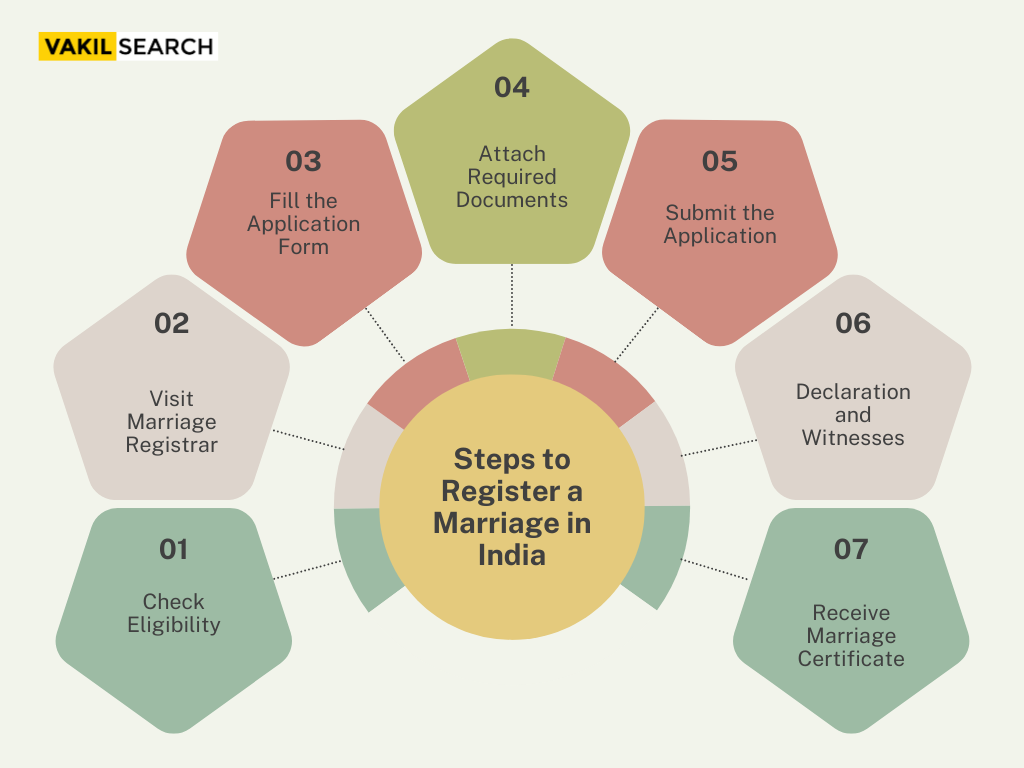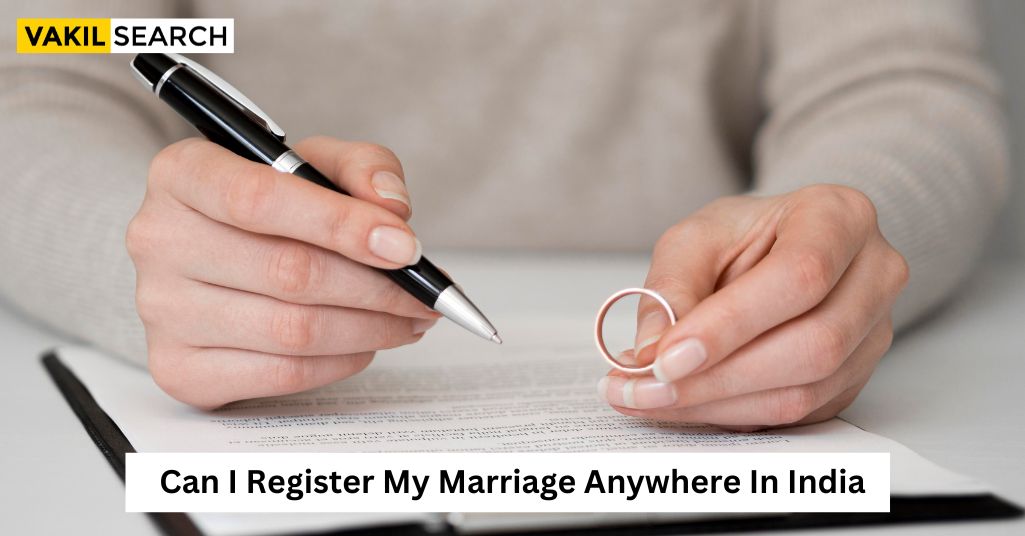Unlock the simplicity of marriage registration in India. Our blog ensures a hassle-free process, empowering you to register your marriage anywhere in the nation
Marriage is a bond that carries out till you die and beyond. Only those who believe they are capable of living their entire lives in this sacred connected relationship of husband and wife should enter the bond.
Meanwhile, amidst all the happiness and planning a wedding, it’s just as significant to have the marriage legalised by our country. This will lead to a marriage certificate, which will be mandatory for any joint initiatives the couple does, such as buying a home or acquiring a marital visa to travel.
Protocol for Registering a Marriage
A marriage certificate is a legal document in India that confirms the union of two people. A Hindu Marriage Act from 1955 or the Special Marriage Act from 1954 govern marriages in India. The Indian Supreme Court ruled in 2006 that to legalise a marriage, it must be registered.
Even though most people are aware that registering for marriage in India is a legal obligation, they are unfamiliar with the procedure and end up paying more to an agent or becoming unduly concerned. Here’s how to register a marriage in India, both online and offline:
Marriage Certificate Online Registration
Marriage registration, like many other vital services in India these days, is also accessible online. Marriage registration Online is preferred since it provides convenience and avoids the need to queue, which is extremely noteworthy in this age of social isolation. It removes the requirement for numerous appointments with the marriage registry.
The procedure is as follows:
- Go to the government of the applicant’s home state’s official website
- Look for the marriage application form on the internet
- For both matrimonial bonds, fill in the relevant information provided on the form
- Submit the marriage certificate online application once you’ve done it
- After the application is completed, the wedding registrar will notify the candidate for a specific timing
- It is vital to arrive on time and with all of the documentation required in the section below at the marriage registrar’s office
- Witnesses from each side must be represented at the marriage registrar’s office at the time of the ceremony
- It’s worth noting that the marriage registrar normally gives the day and timing of the wedding 15-30 days later as per the Hindu Marriage Act, 1955 form. Moreover, in the event of the Special Marriage Act of 1954, it takes almost 60 days.
Offline Marriage Certificate Registration
In 1955, the Hindu Marriage Act was enacted.
In India, marriages are registered through one of the two act either the Hindu Marriage Act (1955) or the Special Marriage Act (1954), as previously mentioned. It applies to all citizens of India, regardless of their religion. Only Hindus, Sikhs, Jains, and Buddhists are eligible to file for a marriage registration in India. The couple might even seek for registration if their marriage has previously been solemnised.
The sub-office, registrar’s within whose authority the marriage was solemnised, must be visited. It can be completed at the sub-office, registrars where one of the members has resided for more than six months. A Hindu marriage can be solemnised according to the customs and rites of either side.
Step by Step Procedure to Register a Marriage in India
-
Eligibility Check:
Confirm that both parties meet legal criteria, such as age, consent, and prohibited relationships.
-
Visit the Marriage Registrar’s Office:
Go to the local marriage registrar’s office where either party has resided for a minimum of 30 days.
-
Get Application Form:
Obtain the prescribed marriage registration form from the registrar’s office.
-
Fill the Form:
Complete the form with accurate details such as names, addresses, and relevant personal information.
-
Attach Documents:
Provide necessary documents, including age and identity proofs, passport-sized photographs, and residence proof.
-
Submit Application:
Submit the completed application form along with the required documents to the marriage registrar.
-
Verification and Publication:
The notice of the intended marriage is published at the office, inviting objections, if any, within 30 days.
-
Objection Handling:
Address any objections raised within the stipulated period. The registrar will investigate and resolve disputes.
-
Declaration and Signatures:
Both parties make a solemn declaration stating their willingness to marry each other. Both sign the declaration in the presence of the marriage registrar.
-
Witnesses:
The presence of two witnesses during the registration process is mandatory. Witnesses should have valid ID proof.
-
Registrar’s Approval:
The marriage registrar examines the documents and, if satisfied, approves the marriage.
-
Receive Marriage Certificate:
After approval, collect the marriage certificate from the registrar. It usually takes a week or two.
-
Legal Validation:
Once the marriage is registered and the certificate is issued, the union is legally recognised

Where to Register a Marriage in India?
In India, marriages are registered at the office of the Sub-Divisional Magistrate (SDM) or the Registrar of Marriages. The specific office may vary based on the jurisdiction of the parties involved. Here’s where you can register a marriage:
-
Local Registrar of Marriages:
Visit the office of the Local Registrar of Marriages in the area where either the bride or the groom has resided for at least 30 days before the marriage.
-
Sub-Divisional Magistrate’s (SDM) Office:
In some states, marriages can be registered at the office of the SDM. Check with the local authorities to confirm the designated office.
-
Municipal Corporation Office:
In urban areas, the Municipal Corporation office often serves as a registration point for marriages. Check with the local corporation authorities.
-
Panchayat Office:
In rural areas, marriages may be registered at the Panchayat office. Confirm the specific procedure with the local Panchayat.
The Special Marriage Act
In 1954, the Special Marriage Act – https://legislative.gov.in/sites/default/files/A1954-43_1.pdf was enacted. The Special Marriage Act of 1954 allows all Indian citizens, regardless of faith, to have their marriages registered. This solemnization as well as registration is provided by the marriage official. As previously stated, couples applying as per the Special Marriage Act must offer a 30-day notice to the sub-registrar in the jurisdiction of one of the members.
The registrar posts a notice on the bulletin board for 30 days, and if no objections are received during that time, the marriage is registered. The jurisdiction’s sub registrar should save a copy of the notice.
This method allows the marriage to be completed without the need for a religious ceremony.
Documents Required for Marriage Registration
The paperwork required to register a marriage in India varies slightly from state to state. The majority of it, though, hasn’t altered. Before submitting any documents, keep in mind that they must be lawfully signed by a gazetted authority.. The listed below are the documents that are standard for all states
- Both parties, i.e. the husband and wife, must sign an application form
- A document that helps as a proof of birth. A birth certificate, passport or matriculation certificate, can all be used. The applicant for marriage registration must be 21 years old for male, and must be 18 years old for female. Both the Hindu Marriage Act of 1955 and the Special Marriage Act of 1954 apply
- Both parties’ evidence of residence is required. It could be a PAN card, a utility bill, an Aadhar card, voter ID card, or a ration card
- When the marriage took place in a religious setting, a certificate from the institution confirming the marriage’s solemnisation
- Marriages registered under the Hindu Marriage Act (1955) will pay the district cashier ₹100; marriages registered under the Special Marriage Act( 1954) will pay the district cashier ₹ 150. The application form should be accompanied by the payment receipt
- A passport-size photo of each member (husband and wife). A photo of the couple, if the wedding was previously solemnised
- The wedding invitation card, if the marriage is solemnised
- As defined by the Hindu Marriage Act of 1955 or the Special Marriage Act of 1954, both members must certify that they are not a relayee or a party to any illegal relationship
- When one of the members is divorced, the application form should be accompanied by an authenticated copy of the divorce decree
- Applicants who are widowed or widowers must attach the death certificate of their spouse to the application form
- If the application form is completed, an affidavit should be submitted outlining the place of marriage, the date, the time, the nationality, and the status of the parties
- A Registrar’s sub-office meeting must be attended by two witnesses from each side
- If the marriage is solemnised in the sub-registrar’s office, two witnesses must be present.
Conclusion
Hope, we have solved your confusion. If you have any questions regarding registration or you wish to register your marriage certificate, please reach out to our Vakilsearch team.
FAQ
Can I get a marriage certificate from any state in India?
Yes, you can obtain a marriage certificate from any state in India, irrespective of where the marriage took place.
How can I register my destination wedding in India?
Register your destination wedding at the local Registrar of Marriages in the area where either party resides.
Can I get a marriage registered in Mumbai if I get married outside Maharashtra?
Yes, you can register your marriage in Mumbai if either party resides in Mumbai for the specified duration.
Can court marriage be done in a different state?
Yes, court marriages can be conducted in a different state, but one of the parties should fulfill the residence requirement of that state.
Can I register marriage in two states in India?
No, a marriage can only be registered in one state. Choose the state where either the bride or the groom has resided for the specified period.
Can I do court marriage anywhere in India?
Yes, court marriages can be conducted anywhere in India, but there are residency requirements for at least one of the parties.
How much money is required for court marriage in India?
Costs vary, including fees for the marriage registrar, solemnisation, and additional expenses. Check with the local authorities for specific charges.
Is court marriage and registered marriage the same?
Court marriage is a type of marriage performed in a court, and a registered marriage involves formal registration. All court marriages are registered, but not all registered marriages are court marriages.







